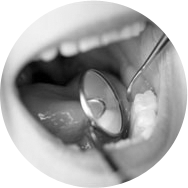Who needs braces?
 Ask yourself this question: "Do I like my smile?" If the answer is no and orthodontics can help, then seeking treatment can be one of the best investments you'll ever make. After all, a smile is a priceless, precious asset — one that lasts for a lifetime. And people who have corrective orthodontic treatment — at any age — are invariably glad they did.
Ask yourself this question: "Do I like my smile?" If the answer is no and orthodontics can help, then seeking treatment can be one of the best investments you'll ever make. After all, a smile is a priceless, precious asset — one that lasts for a lifetime. And people who have corrective orthodontic treatment — at any age — are invariably glad they did.
Mom and Dad
Are you happy with your smile? Why not get your teeth straightened at the same time your child is in the office? Ask us about our Adults Orthodontics Program. We have clear and invisible braces to give you the result that will make you smile from ear to ear!
It's not just about appearances. Malocclusions, or "bad bites," can affect the way you chew, talk, or smile, and can even lead to more serious (and expensive) oral health problems. Some of the common conditions that can be corrected with orthodontic treatment are:
- Crowded Teeth - teeth are crooked, turned, or overlapping
- Excessive Overbite - the upper jaw or teeth are too far in front, or the lower too far back
- Underbite - the lower jaw or teeth are too far in front, or the upper too far back
- Protrusion - the upper teeth stick out and do not fit with the lower front teeth
- Excessive Spacing - teeth that have wide gaps or spaces between them.
Interceptive Orthodontics
To ensure the best overall dental and facial development, all children should have an orthodontic consultation sometime between the ages of three to five. Usually, nothing more than observation is needed but if a problem is evident, taking action early (interceptive orthodontics) can help avoid more expensive and more extensive treatment later on. By age seven the first permanent molars and incisors have usually come in, and crossbites, crowding or protrusions can be evaluated. At this time, we can identify current or anticipated dental problems and determine the best time for treatment.
Benefits of Early Treatment
 Many orthodontic problems can be treated before all permanent teeth are in. If you suspect your child has a bite problem, or if his or her teeth, lips, or jaw don't look normal for their age, make sure to bring it to our orthodontist’s attention.
Many orthodontic problems can be treated before all permanent teeth are in. If you suspect your child has a bite problem, or if his or her teeth, lips, or jaw don't look normal for their age, make sure to bring it to our orthodontist’s attention.
Here are some signs to look for that could indicate they need an orthodontic evaluation:
- Speech problems
- Difficulty chewing
- Mouth breathing
- Thumb or finger sucking habit
And here's what early treatment can do:
- - Minimize severe bite problems
- - Improve facial appearance and self-esteem
- - Correct functional problems
- - Minimize the effects of abnormal growth patterns
- - Reduce protrusion so that front teeth are less susceptible to injury
- - Minimize or eliminate the need for extraction of permanent teeth
- - Address a serious mismatch between the growth of the upper and lower jaws
- - Eliminate adverse habits such as thumb/finger sucking
- - Make treatment with braces easier and shorter